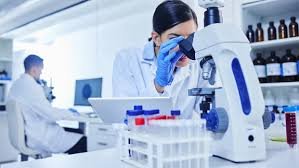BostonGene and Kyoto University Launch AI Collaboration to Advance Precision Treatment for Esophageal Cancer
14 November 2025 | Friday | News

Image Source : Public Domain
-BostonGene, developer of the leading AI foundation model for cancer and the immune system, and Kyoto University, a research institution known for its groundbreaking advancements in medicine and science announced today a research collaboration to develop advanced biological signatures to enhance targeted treatment strategies for patients with esophageal squamous cell carcinoma (ESCC).
"Through this collaboration, we will apply cutting-edge AI-powered analytics to clinical data, enabling us to identify biomarkers that can directly inform treatment decisions and improve patient outcomes."
This research will leverage BostonGene’s AI-powered, multi-scale, omnimodal platform to analyze tumor molecular profiles and assess their correlation with response to a novel immune checkpoint inhibitor (ICI) and chemoradiotherapy (CRT) combination therapy. The study builds on the NOBEL trial, an investigator-initiated clinical study led by Dr. Manabu Muto of Kyoto University, by integrating genomic and transcriptomic profiling from ESCC patients to identify immune-related biomarkers that drive drug development, optimize clinical trial design and enable more accurate patient stratification.
As part of the collaboration, Kyoto University will provide clinical samples and patient data and BostonGene will apply its AI-powered molecular analytics to uncover key biological pathways and associated biomarkers influencing treatment response.
"This collaboration will generate actionable insights into the tumor microenvironment and immune landscape of esophageal cancer," said Yukimasa Shiotsu, PhD, President of BostonGene Japan. "Combining Kyoto University’s clinical expertise and BostonGene’s AI-powered analytics, we will refine and advance precision treatment strategies for ESCC patients."
"Understanding the molecular and immune characteristics of ESCC is essential for developing more effective treatment strategies," said Dr. Manabu Muto, Professor at Kyoto University and Principal Investigator of the NOBEL trial. "Through this collaboration, we will apply cutting-edge AI-powered analytics to clinical data, enabling us to identify biomarkers that can directly inform treatment decisions and improve patient outcomes."
Most Read
- Innovations In Magnetic Resonance Imaging Introduced By United Imaging
- Management of Relapsed/Refractory Multiple Myeloma
- 2025 Drug Approvals, Decoded: What Every Biopharma Leader Needs to Know
- BioPharma Manufacturing Resilience: Lessons From Capacity Expansion and Supply Chain Resets from 2025
- APAC Biopharma Review 2025: Innovation, Investment, and Influence on the Global Stage
- Top 25 Biotech Innovations Redefining Health And Planet In 2025
- How Health Systems Are Reshaping Drug Adoption, Partner Models, and Market Access in 2026
- The New AI Gold Rush: Western Pharma’s Billion-Dollar Bet on Chinese Biotech
- Single-Use Systems Are Rewiring Biopharma Manufacturing
- The State of Biotech and Life Science Jobs in Asia Pacific – 2025
- Asia-Pacific Leads the Charge: Latest Global BioSupplier Technologies of 2025
- Invisible Threats, Visible Risks: How the Nitrosamine Crisis Reshaped Asia’s Pharmaceutical Quality Landscape
Bio Jobs
- The State of Biotech and Life Science Jobs in Asia Pacific – 2025
- Avantor’s New CEO Ligner Aims to Unlock Global Potential and Deliver Shareholder Value
- AstraZeneca Commits $50 Billion to U.S. Expansion by 2030 in Biggest-Ever Global Investment
- Thermo Fisher, SAMRC, and South Africa’s Department of Science and Innovation Launch CATIR to Nurture Next-Gen Scientists
- Cube Biotech Appoints Former Sartorius CEO Dr. Joachim Kreuzburg to Board of Directors
- FDA’s AI Transition Marks a Turning Point in Drug Review: Industry Faces Pressure to Adapt Amid 20% Workforce Cut
- WuXi XDC Completes Mechanical Build of Singapore Bioconjugate Manufacturing Hub
News
Editor Picks











